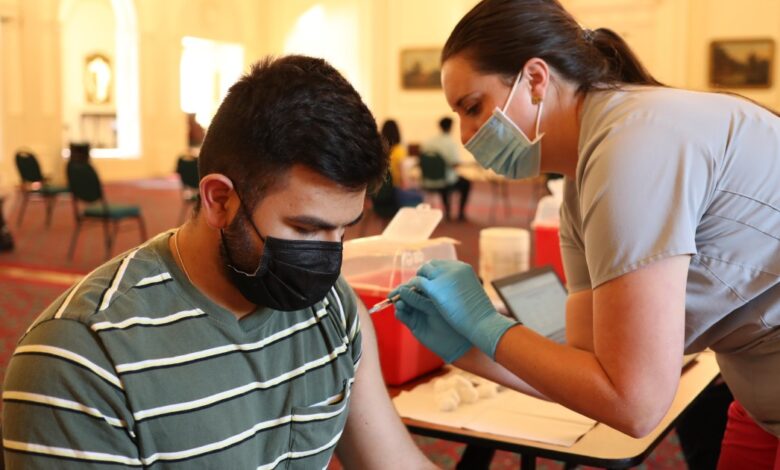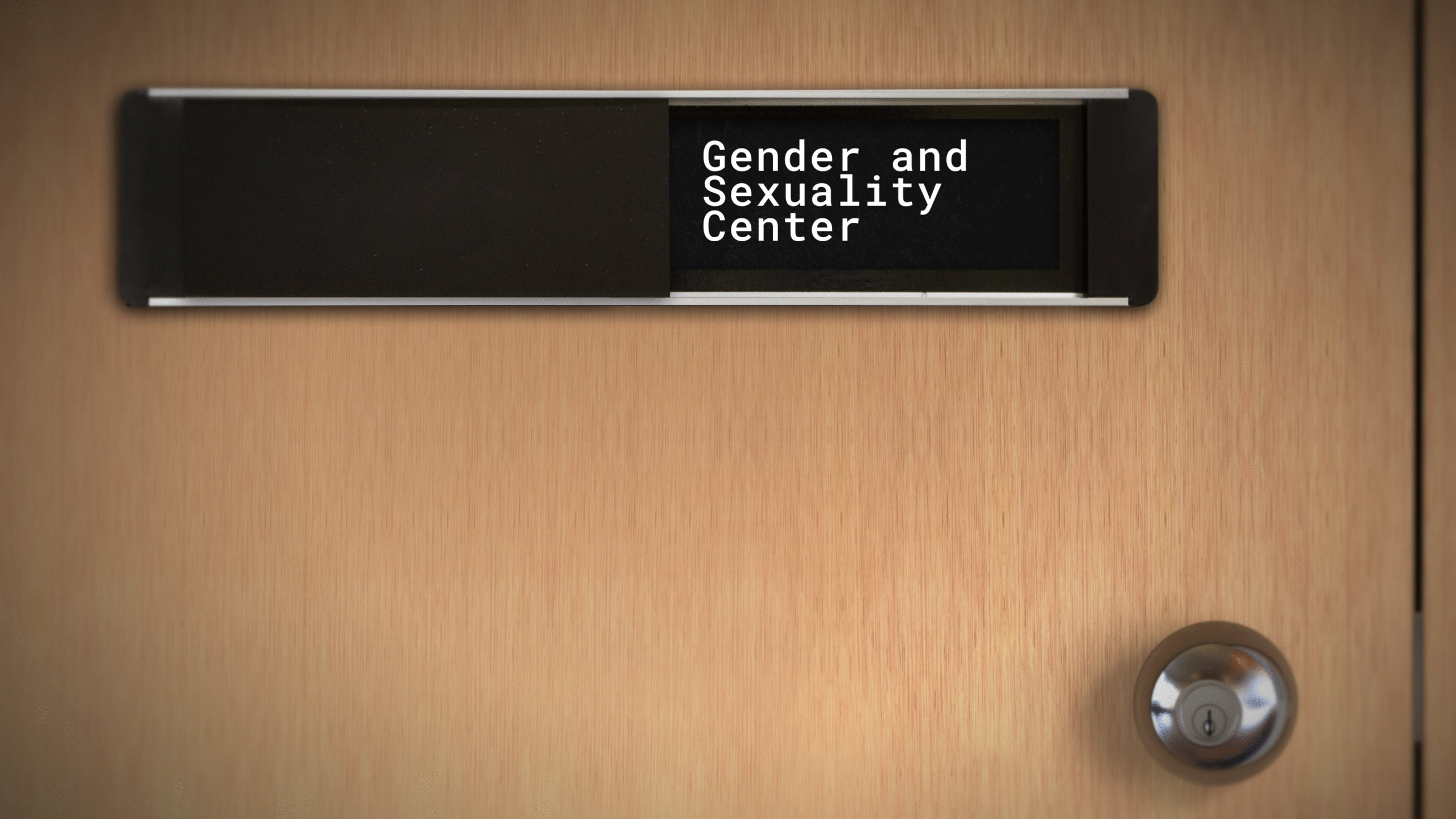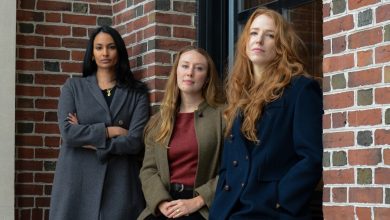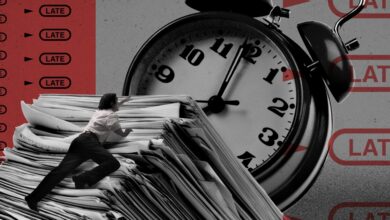This Fall, the Unvaccinated Face New Campus Rules and Restrictions

[ad_1]
A highly regulated semester is underway for unvaccinated college students and employees.
Last fall, before the Covid-19 vaccines were widely available, many campuses mandated masks, required regular or random testing, and barred large gatherings. Now, colleges are developing parallel sets of policies, depending on vaccination status — employees and students who are not fully vaccinated will experience stricter rules, while those who are fully vaccinated will see many of those rules pared back.
Some regulations are straightforward — for example, regular testing is required for unvaccinated people at many colleges. Others are more complicated, touching on such scenarios as when people eat lunch, or how students can get access to isolation housing. It adds up to a policy structure that depends on where colleges are located, whether they are public or private, and how and when state lawmakers enact restrictions.
Even on campuses with mask and vaccine requirements, there are nuances. Washington State University, for example, requires masks for everyone in nearly all indoor spaces on campus. The state’s Democratic governor has mandated vaccines for all higher-education employees by October 18, with exceptions for those with medical or religious exemptions.
Still, vaccinated employees will have certain carve-outs from the mask mandate that unvaccinated employees do not. They can remove their masks while teaching classes at a six-foot distance or while working with other vaccinated people in areas with restricted access. At their desks, unvaccinated employees can take off their masks only if their workstations have six-foot-high partitions on three sides, as long as the fourth side does not directly open toward a colleague. While fully vaccinated people can use break rooms without masks, unvaccinated people are asked to alternate break schedules or eat in “alternate locations.”
Having distinct rules according to vaccination status is in keeping with broader public-health messaging. The U.S. Centers for Disease Control and Prevention has urged unvaccinated people to take steps — like avoiding travel or quarantining after exposure — that are not recommended for those who are fully vaccinated. Unvaccinated people are more likely to experience severe symptoms after contracting Covid-19. Measures that prevent unvaccinated students and employees from contracting the virus or exposing others to it could mitigate severe illness or outbreaks.
But there are other reasons colleges are instituting new rules. They tried for months to encourage vaccinations through drawings for money, including cash for scholarships and school supplies. Northern Virginia Community College is issuing vaccinated students $250 on their student ID cards. If more than half of University of Central Oklahoma students get vaccinated by October 1, fall break will be extended by one day.
That was the carrot. Having to navigate extra policies could well be the stick.
Baylor University, in Waco, Tex., is requiring all students who are either not fully vaccinated or do not have a positive test recorded in the past 180 days to test twice weekly for the first four weeks of the semester. Models showing the pace of spread for the Delta variant among unvaccinated people persuaded the university’s medical experts that regular testing is necessary. If Baylor were to test just one day each week, “we wouldn’t stay on top of it fast enough,” said Jim Marsh, dean for student health and wellness.
Ideally, Marsh said, students would choose to get the vaccine to protect themselves after the campus emphasized the benefits of the shot. The university, he said, is not adding additional regulations to drive vaccinations. But “if they choose out of an inconvenience,” he said, “so be it.”
At the University at Albany, which is in the State University of New York system, students are required to get the vaccine unless they are approved for an exemption, now that the U.S. Food and Drug Administration has given full approval to the Pfizer-BioNTech vaccine. Students who become ill with Covid-19 will have different resources available to them, depending on their vaccination status. The campus has said it will allow only fully vaccinated residential students to access on-campus isolation housing if they’ve tested positive for the virus. That marks a change from previous semesters, when any positive student who lived on campus could gain access to such housing.
The university “doesn’t feel it’s fair for us to bear the costs” for students who did not comply with the vaccination requirement.
“Residential students who are partially vaccinated or who were approved for a vaccination exemption will be required to go home or to a hotel, at their own cost,” the policy reads. (If unvaccinated students can demonstrate financial hardship or other personal circumstances that justify campus housing, they may still be able to use the isolation housing, said Kevin C. Wilcox, associate vice president for enterprise risk management.)
Before the FDA’s approval, motivating people to get the vaccine was one reason Albany created this policy. Another was space constraints, Wilcox said. The campus brought all of its students back this semester, filling residential housing that could have otherwise been used for isolation.
Quarantine housing is expensive for colleges — it requires hiring staff, reserving space, and setting up mini-fridges for every individual room. The university “doesn’t feel it’s fair for us to bear the costs” for students who did not comply with the vaccination requirement, Wilcox said.
A ‘Battle’ Not Taken On
Texas Tech University initially tried a similar approach, but it backed off shortly after the semester started.
In mid-August, Texas Tech’s provost published a memo that said the university would either provide space for isolation or cover off-campus housing expenses for vaccinated people who needed to isolate after testing positive. For unvaccinated residential students who test positive, Texas Tech would “offer information” on off-campus housing options but would not “cover any associated expenses.”
Administrators initially thought “it would be a motive to be vaccinated,” said Lawrence E. Schovanec, the university’s president. But parents were concerned “that our policy may have been discriminatory in terms of those who were not vaccinated. … We decided this wasn’t a battle that we needed to take on.”
He said he received fewer than a dozen complaints; the university has about 40,000 students. Shortly into the semester, campus leaders reversed course on isolation housing for the unvaccinated. “We acted out of a sense of concern and care for those who were affected,” Schovanec said.
At Texas Tech, policies still distinguish between vaccinated and unvaccinated employees. Unvaccinated staff and faculty who are exposed to the virus — except those who recently recovered from it — must use sick or vacation leave for a seven- to 14-day quarantine period. (Employees can request to work remotely during this period.) Vaccinated employees do not need to quarantine.
Campus leaders at Texas Tech say they do not know how many people on campus are vaccinated. While the university has allowed students to upload their vaccination records, state executive orders bar universities from mandating masks or vaccinations, which would skew responses and make estimates imprecise. Provost Ronald L. Hendrick said he believes most faculty are vaccinated, but rates are “variable” among staff and students.
In several states, like Texas, administrators are making policy decisions in a legislative environment that bars vaccine or mask mandates. In states that allow for vaccine mandates, colleges have taken even more drastic steps, like fining or disenrolling students not in compliance with the mandates.
In some states, policies are still evolving, which has required changes at other institutions.
In Ohio, for example, a new law bars public colleges and schools from requiring people to get vaccines that have not received full FDA approval. Campuses also cannot “discriminate against an individual who has not received” such a vaccine, “including by requiring the individual to engage in or refrain from engaging in activities or precautions that differ from the activities or precautions of an individual who has received such a vaccine.”
Over the summer, Ohio State University announced it would ask unvaccinated students to get tested weekly until mid-October, when the law takes effect.
But now that the Pfizer-BioNTech vaccine has full FDA approval, the law does not apply. Ohio State requires the vaccine. Individuals who do receive an exemption from the requirement must get tested weekly, wear a face mask at all times indoors, and take an online course on “appropriate workplace conduct to reduce the risk of transmission of the virus as an unvaccinated individual.”
[ad_2]
Source link






